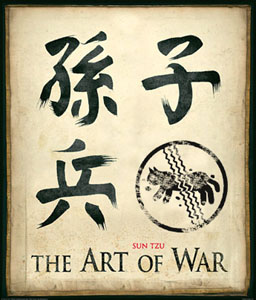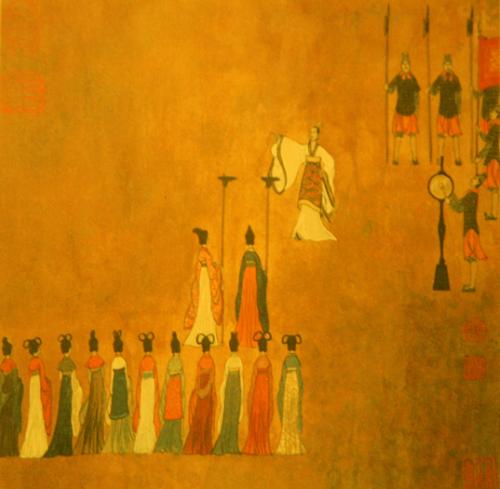August 12, 2010
memes in infosec II - War! Infosec is WAR!
 Another metaphor (I) that has gained popularity is that Infosec security is much like war. There are some reasons for this: there is an aggressive attacker out there who is trying to defeat you. Which tends to muck a lot of statistical error-based thinking in IT, a lot of business process, and as well, most economic models (e.g., asymmetric information assumes a simple two-party model). Another reason is the current beltway push for essential cyberwarfare divisional budget, although I'd hasten to say that this is not a good reason, just a reason. Which is to say, it's all blather, FUD, and oneupsmanship against the Chinese, same as it ever was with Eisenhower's nemesis.
Another metaphor (I) that has gained popularity is that Infosec security is much like war. There are some reasons for this: there is an aggressive attacker out there who is trying to defeat you. Which tends to muck a lot of statistical error-based thinking in IT, a lot of business process, and as well, most economic models (e.g., asymmetric information assumes a simple two-party model). Another reason is the current beltway push for essential cyberwarfare divisional budget, although I'd hasten to say that this is not a good reason, just a reason. Which is to say, it's all blather, FUD, and oneupsmanship against the Chinese, same as it ever was with Eisenhower's nemesis.
Having said that, infosec isn't like war in many ways. And knowing when and why and how is not a trivial thing. So, drawing from military writings is not without dangers. Consider these laments about applying Sun Tzu's The Art of War to infosec from Steve Tornio and Brian Martin:
In "The Art of War," Sun Tzu's writing addressed a variety of military tactics, very few of which can truly be extrapolated into modern InfoSec practices. The parts that do apply aren't terribly groundbreaking and may actually conflict with other tenets when artificially applied to InfoSec. Rather than accept that Tzu's work is not relevant to modern day Infosec, people tend to force analogies and stretch comparisons to his work. These big leaps are professionals whoring themselves just to get in what seems like a cool reference and wise quote.
"The art of war teaches us to rely not on the likelihood of the enemy's not coming, but on our own readiness to receive him; not on the chance of his not attacking, but rather on the fact that we have made our position unassailable." - The Art of War
The Art of SunTzu is not a literal quoting and thence mad rush to build the tool. Art of War was written from the context of a successful general talking to another hopeful general on the general topic of building an army for a set piece nation-to-nation confrontation. It was also very short.
Art of War tends to interlace high level principles with low level examples, and dance very quickly through most of its lessons. Hence it was very easy to misinterpret, and equally easy to "whore oneself for a cool & wise quote."
However, Sun Tzu still stands tall in the face of such disrespect, as it says things like know yourself FIRST, and know the enemy SECOND, which the above essay actually agreed with. And, as if it needs to be said, knowing the enemy does not imply knowing their names, locations, genders, and proclivities:
Do you know your enemy? If you answer 'yes' to that question, you already lost the battle and the war. If you know some of your enemies, you are well on your way to understanding why Tzu's teachings haven't been relevant to InfoSec for over two decades. Do you want to know your enemy? Fine, here you go. your enemy may be any or all of the following:
- 12 y/o student in Ohio learning computers in middle school
- 13 y/o home-schooled girl getting bored with social networks
- 15 y/o kid in Brazil that joined a defacement group
- ...
Of course, Sun Tzu also didn't know the sordid details of every soldier's desires; "knowing" isn't biblical, it's capable. Or, knowing their capabilities, and that can be done, we call it risk management. As Jeffrey Carr said:
The reason why you don't know how to assign or even begin to think about attribution is because you are too consumed by the minutia of your profession. ... The only reason why some (OK, many) InfoSec engineers haven't put 2+2 together is that their entire industry has been built around providing automated solutions at the microcosmic level. When that's all you've got, you're right - you'll never be able to claim victory.
Right. Most all InfoSec engineers are hired to protect existing installations. The solution is almost always boxed into the defensive, siege mentality described above, because the alternate, as Dan Geer apparently said:

When you are losing a game that you cannot afford to lose, change the rules. The central rule today has been to have a shield for every arrow. But you can't carry enough shields and you can run faster with fewer anyhow.The advanced persistent threat, which is to say the offense that enjoys a permanent advantage and is already funding its R&D out of revenue, will win as long as you try to block what he does. You have to change the rules. You have to block his success from even being possible, not exchange volleys of ever better tools designed in response to his. You have to concentrate on outcomes, you have to pre-empt, you have to be your own intelligence agency, you have to instrument your enterprise, you have to instrument your data.
But, at a corporate level, that's simply not allowed. Great ideas, but only the achievable strategy is useful, the rest is fantasy. You can't walk into any company or government department and change the rules of infosec -- that means rebuilding the apps. You can't even get any institution to agree that their apps are insecure; or, you can get silent agreement by embarrassing them in the press, along with being fired!
I speak from pretty good experience of building secure apps, and of looking at other institutional or enterprise apps and packages. The difference is huge. It's the difference between defeating Japan and defeating Vietnam. One was a decision of maximisation, the other of minimisation. It's the difference between engineering and marketing; one is solid physics, the other is facade, faith, FUD, bribes.
It's the difference between setting up a world-beating sigint division, and fixing your own sigsec. The first is a science, and responds well by adding money and people. Think Manhattan, Bletchley Park. The second is a societal norm, and responds only to methods generally classed by the defenders as crimes against humanity and applications. Slavery, colonialism, discrimination, the great firewall of China, if you really believe in stopping these things, then you are heading for war with your own people.
Which might all lead the grumpy anti-Sun Tzu crowd to say, "told you so! This war is unwinnable." Well, not quite. The trick is to decide what winning is; to impose your will on the battleground. This is indeed what strategy is, to impose ones own definition of the battleground on the enemy, and be right about it, which is partly what Dan Geer is getting at when he says "change the rules." A more nuanced view would be: to set the rules that win for you; and to make them the rules you play by.
And, this is pretty easily answered: for a company, winning means profits. As long as your company can conduct its strategy in the face of affordable losses, then it's winning. Think credit cards, which sacrifice a few hundred basis points for the greater good. It really doesn't matter how much of a loss is made, as long as the customer pays for it and leaves a healthy profit over.
 Relevance to Sun Tzu? The parable of the Emperor's Concubines!
Relevance to Sun Tzu? The parable of the Emperor's Concubines!
In summary, it is fair to say that Sun Tzu is one of those texts that are easy to bandy around, but rather hard to interpret. Same as infosec, really, so it is no surprise we see it in that world. Also, war as a very complicated business, and Art of War was really written for that messy discipline ... so it takes somewhat more than a familiarity from both to successfully relate across beyond a simple metaphor level.
And, as we know, metaphors and analogues are descriptive tools, not proofs. Proving them wrong proves nothing more than you're now at least an adolescent.
Finally, even war isn't much like war these days. If one factors in the last decade, there is a clear pattern of unilateral decisions, casus belli at a price, futile targets, and effervescent gains. Indeed, infosec looks more like the low intensity, mission-shy wars in the Eastern theaters than either of them look like Sun Tzu's campaigns.
memes in infosec I - Eve and Mallory are missing, presumed dead
Posted by iang at August 12, 2010 04:34 PM | TrackBack...
Which, according to Moffett, is what can make human cyberwar and terrorist cells so effective. Battles waged on the web are often “downright ant-like,” with massive, networked groups engaging in strategic teamwork to rise up with little hierarchy. “Such ‘weak ties’ — wide-ranging connections that take us beyond the tight-knit groups we interact with regularly — are likely of special importance in organizing both ants and people,” Moffett notes in his book.
...
